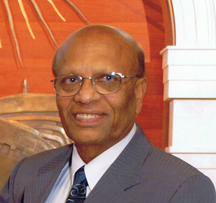Dr. Manoj Jain is a practicing physician in Memphis, Tennessee. He is the son of a classmate of mine, Dr. Vinay Jain from Boston. Manoj and my son are of the same age and they practically grew up together in the Boston area, where we too lived for many years. Manoj writes regularly in many newspapers including The New York Times, The Washington Post, as well as corresponding for CNN. Readers can view many of his writings and thoughts on www.mjain. net.
He is a role model for many about the ahimsak way of life. Please read on, in his own words about an encounter he had:
“I was standing at the bedside of a patient who was having shaking chills with a temperature of 103. Sweat covered his balding scalp like dew, then coalesced and rolled down his neck like raindrops. Just 20 minutes earlier, a specialist had visited him and talked with him about his dire prognosis of metastatic cancer. No family was in the room.
This was just my second visit to him. I wondered: How do I show compassion?
I recalled driving down Poplar Avenue after a downpour on the weekend Nashville got flooded. That is when I saw a woman in the opposite lane to me, standing in the middle of the road with her car pulled to the side. Like a state trooper with her raised hands, she was halting the traffic on Poplar.
Perplexed, I looked around until I saw a dome-shaped creature crossing the road. What made the woman risk her life to save a turtle? I’m a vegetarian and an animal-rights advocate, but I wouldn’t risk my life to help a slow tortoise cross a wet and busy street.
As I drove on, in my rearview mirror I saw the turtle safely reach the other side. And I wondered: In the big picture, does a single small act of compassion really make any difference?
After all, we live in a world filled with violence. There are wars in Iraq and Afghanistan; the festering conflicts in Israel and Palestine; and the homicides, robberies and shootings in our city. There are also nasty e-mail reply-alls at work and angry outbursts at home. The cycle of violence is perpetual, it seems.
We look for some kind of master plan to end all violence. We hope for a single meeting at work or a heartfelt conversation at home to make everything better. But as I grow older, I have realized that things don’t happen that way.
Often in life, there are small acts of compassion: things people do without looking for reward or praise, acts for which people do not calculate the return on investment. These acts of compassion move us and bring us to tears.
Compassion has many modern-day champions. My favorites are Mahatma Gandhi, Dr. Martin Luther King Jr., Mother Teresa and the Dalai Lama. Each year in Memphis, the Gandhi- King Conference held at Christian Brothers University brings together national speakers to rejuvenate their spirit and the spirit of compassion within us.
This year, the conference opens with a talk by civil rights leader Rev. Samuel Billy Kyles at 1 p.m. Oct. 23. Tim Wise, a prominent anti-racist writer and activist, closes out the conference with a banquet dinner on Saturday night at Mississippi Boulevard Christian Church.
At these conferences, what I learn is that compassion and respect—tangible expressions of the philosophy of nonviolence—are opportunities for us to break the cycle of violence through our ordinary, everyday moments. Compassion is a necessary and learnable skill we need to develop.
And studies show that compassion is one of four traits that patients seek in their doctors, along with competency, communication skills and convenience.
As I considered what to do as my patient was lying in bed, I surveyed my surroundings and reached for a clean bath towel. Gently, I wiped the sweat off his brow—a task often relegated to a nursing assistant or nurse. A few days later, my patient left the hospital with hospice.
As for the woman on Poplar, I am not sure if she realized that her simple act of compassion affected me. And I am not sure if my simple act may have an impact on others, who then will also do simple acts of compassion today, affecting still others, in a sort of cycle of nonviolence.”
An Ahimsa Crisis: You Decide: Compassion Breaking The Cycle Of Violence
Author:
 Dr. Sulekh Chand Jain
Dr. Sulekh Chand Jain
 Dr. Sulekh Chand Jain
Dr. Sulekh Chand Jain
Published: 02.09.2016
Sources
 Title: An Ahimsa Crisis You Decide
Title: An Ahimsa Crisis You DecideAuthor: Sulekh C. Jain
Edition: 2016, 1st edition
Publisher: Prakrit Bharati Academy, Jaipur, India
Page glossary
Some texts contain footnotes and glossary entries. To distinguish between them, the links have different colors.
Page statistics
This page has been viewed 948 times.